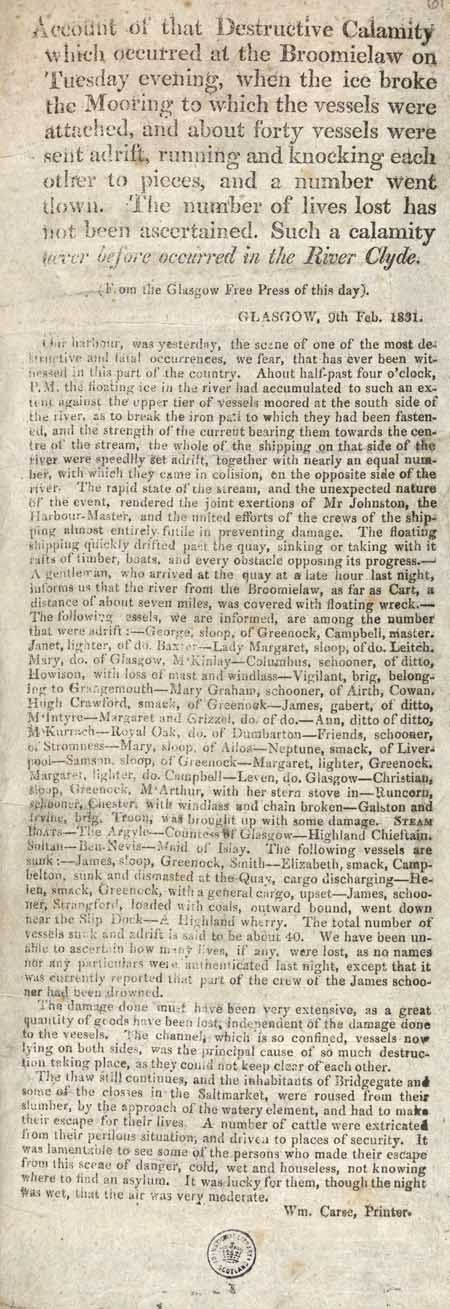Transcription
Account of that Destructive Calamity
which occured at the Broomielaw on
Tuesday evening, When the ice broke
the Mooring to which the vessels were
attached, and about forty vessels were
sent adrift runnirig and knocking each
other to pieces, and a number went
down. The number of lives lost has
not been ascertained Such a calamity
never before occurred in the River Clyde. (From the Glasgow Free Press of this day). GLASGOW, 9th feb. 1831. Our harbour, was yesterday, the scene of one of the most de-
structive and fatal occurrences, we fear, that has ever been wit-
neseed in this part of the country. Ahout half-past four o'clock,
P. M. the floating ice in the river had accumulated to such an ex-
tent against the upper tier of Vessels moored at the south side of
the river, as to break the iron pail to which they had been faste-
ed, and the strength of the current bearing them towards the cen-.
tre of the stream, the whole of the shipping on that side of the.
river were speedlly set adrift, together with nearly an equal num-
ber, with which they came in colision, on the opposite side of the
river. The rapid state of the stream, and the unexpected nature
of the event, rendered the joint exertions of Mr Johnston, the
Harbour-Master, and the united efforts of the crews of the ship
ping almost entirely., futile in .preventing damage. The floating
shipping quickly drifted past, the quay, sinking or taking with it
rafts of timber, boats, and every obstacle opposing its progress.
A gentleman, who arrived at the quay at a late hour last night,
informs us that the river from the Broomielaw, as far as Cart, a
distance of about seven miles, was covered with floating wreck.-
The following essels, we are informed, are among the number
that were adrift:?George sloop, of Greenock, Campbell, master.
Janet, lighter, of do. Baxter?Lady Margaret, sloop of do. Leitch.
Mary, do. of Glasgow,.M'Kinlay?Columbus, schooner, of ditto,
Howison, with loss of mast and windlass?Vigilant, brig, belong-
ing to Grangemouth?Mary Graham ; schooner, of Airth, Cowan,
Hug'h Crawford, smack, of Greenock?James, gabert, of ditto,
M'Intyre?Margaret and Grizzel, do, of do.? Ann, ditto of ditto,
M'Kurrach?Royal Oak, do. of Dumbarton?Friends, schooner,
of Stromness?Mary, sloop, of Alloa?Neptune, smack, of Liver-
pool?Samson, sloop, of Greenock?-Margaret lighter, Greenock,
Margaret, lighter, do. Campbell?Leven, do. Glasgow?Christian,
sloop, Greenock, M'Arthur, with her stern stove in?Runcorn,
schooner,Chester, with windlass and chain broken?Galston and
irvine, brig, Troon, was brought up with some damage, STEAM
BOATS?The Argyle?Countess of Glasgow?Highland Chieftain.
Sultan?Ben-Nevis?Maid of Islay. The following vessels are
sunk:--James, sloop, Greenock, Smith?Elizabeth,smack, Camp-
belton, sunk and dismasted at the Quay, cargo discharging?He-
len, smack, Greenock, with a general cargo, upset-?James, schoo-
ner strangford, loaded with coals, outward bound, went down
near the Slip Dock?A Highland wherry. The total number of
vessels sunk and adrift is said to be about 40. We have been un-
able to ascertain how many lives, if any, were lost, as no names
nor any particulars were authenticated last night, except that it
was currently reported that part of the crew of the James schoo-
ner had been .drowned. The damage done must have been very extensive, as a great
quantity of goods have been lost, independent of the damage done
to the veesels. The channel, which is so confined, vessels now
lying on both sides, was the principal cause of so much destruc-
tion taking place, as they could not keep clear of each other. The thaw still continues, and the inhabitants of Bridgegate and
some of the closses in the Saltmarket, were roused from their
slumber, by the approach of the watery element, and had to make
their escape for their lives, A number of cattle were extricated
from their perilous situation; and driven to places of security. It
was lamentable to see some of the persons who made their escape
from this scene of danger, cold, wet and houseless, not knowing
where to find an asylum. It was lucky for them, though the night
was wet, that the air was very moderate. Wm. Carse, Printer.
View Commentary | Download PDF Facsimile
|
 |
Date of publication:
1831 shelfmark: F.3.a.13(61)
 View larger image
View larger image
|


